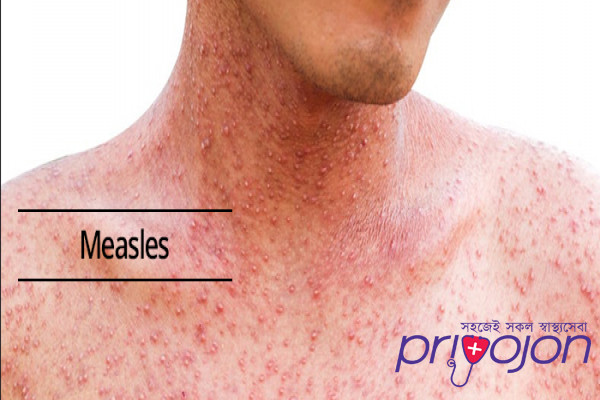Shared on 27-02-2020
Measles
Measles

Measles is a contagious infection that causes a full-body rash. It’s spread from person to person through the air and can be especially dangerous for kids and babies.
A vaccine for measles was developed in the 1960s, which drastically reduced the rate of the disease. In fact, in 2000, measles was declared to be virtually eliminated in the United States. However, there continue to be small outbreaks. In Minnesota, there were 79 confirmed cases of measles in summer 2017 before the disease was contained.
Larry Richmond, MD, a family medicine doctor with Park Nicollet Clinic in Plymouth, explains ways you can protect yourself and your children – and why it's so important that you do.
What are the symptoms of measles?
Dr. Richmond: The most common symptoms are fever, along with ear pain, cough, runny nose, red eyes and rash. However, a rash does not develop right away.
How is measles spread?
Dr. Richmond: Measles is highly contagious for those who are not vaccinated. It lives in the nose and throat mucus of an infected person. It can spread to others through coughing and sneezing. In addition, measles virus can live for up to two hours in an airspace where the infected person coughed or sneezed.
For more information, visit the Centers for Disease Control and Prevention website.
What should I do if I suspect my child has measles?
Dr. Richmond: If you think your child has measles, call your doctor for instructions. If you can, avoid walking into a clinic without advanced warning. Instead, give the clinic a heads up that you and your child are coming. It will give the clinic a chance to prepare an isolated room for your child, and bring them there as soon as you arrive. This is important because measles can be highly contagious.
Is there a vaccine for measles?
Dr. Richmond: Yes. Getting immunized against measles is the best and safest way to prevent the disease. And the vaccine that’s given for it also prevents against mumps and rubella. This measles, mumps and rubella (MMR) vaccine has two parts. You get your first shot at age 12 months. Then later you get a shot of a second dose.
If your child is 12 months or older and has not yet had their first dose of the MMR vaccine, schedule an appointment as soon as possible for your child to get this initial shot. Our priority is making sure patients get in for their first dose. More information will be coming about the second dose.
To learn more about how and where you can bring your child to get vaccinated, contact any of our HealthPartners clinics, Park Nicollet clinics or clinics in the St. Croix Valley.
Are the measles vaccine and other vaccines safe for my child?
Dr. Richmond: Yes. Vaccines go through many tests before reaching your doctor’s office. Those tests have to show they work and are not dangerous. It is then that vaccines can be approved for patients. And even after they are approved, they continue to be watched for safety and usefulness.
The researchers at HealthPartners Institute are among those who study vaccine safety. All of their research points to vaccines being the best and safest way to prevent diseases like the measles. This is because vaccines work with the body’s natural defenses to develop its own resistance to illnesses.
To learn what vaccines you should get at what age, check out our interactive tool.
My child has gotten the first dose of MMR, but not the second. When can he/she get the second dose?
Dr. Richmond: The second dose is typically given between four and six years of age. Call your doctor to find out when your child can receive the second dose.
Once you have those two shots, are you safe from measles?
Dr. Richmond: Once you get the MMR vaccine, you are generally set. You can get a blood test to make sure you are immune. And on some rare occasions a second dose isn’t recommended for patients. However, if you’ve done both shots initially, you should be good.
Measles is a contagious infection that causes a full-body rash. It’s spread from person to person through the air and can be especially dangerous for kids and babies.
A vaccine for measles was developed in the 1960s, which drastically reduced the rate of the disease. In fact, in 2000, measles was declared to be virtually eliminated in the United States. However, there continue to be small outbreaks. In Minnesota, there were 79 confirmed cases of measles in summer 2017 before the disease was contained.
Larry Richmond, MD, a family medicine doctor with Park Nicollet Clinic in Plymouth, explains ways you can protect yourself and your children – and why it's so important that you do.
What are the symptoms of measles?
Dr. Richmond: The most common symptoms are fever, along with ear pain, cough, runny nose, red eyes and rash. However, a rash does not develop right away.
How is measles spread?
Dr. Richmond: Measles is highly contagious for those who are not vaccinated. It lives in the nose and throat mucus of an infected person. It can spread to others through coughing and sneezing. In addition, measles virus can live for up to two hours in an airspace where the infected person coughed or sneezed.
For more information, visit the Centers for Disease Control and Prevention website.
What should I do if I suspect my child has measles?
Dr. Richmond: If you think your child has measles, call your doctor for instructions. If you can, avoid walking into a clinic without advanced warning. Instead, give the clinic a heads up that you and your child are coming. It will give the clinic a chance to prepare an isolated room for your child, and bring them there as soon as you arrive. This is important because measles can be highly contagious.
Is there a vaccine for measles?
Dr. Richmond: Yes. Getting immunized against measles is the best and safest way to prevent the disease. And the vaccine that’s given for it also prevents against mumps and rubella. This measles, mumps and rubella (MMR) vaccine has two parts. You get your first shot at age 12 months. Then later you get a shot of a second dose.
If your child is 12 months or older and has not yet had their first dose of the MMR vaccine, schedule an appointment as soon as possible for your child to get this initial shot. Our priority is making sure patients get in for their first dose. More information will be coming about the second dose.
To learn more about how and where you can bring your child to get vaccinated, contact any of our HealthPartners clinics, Park Nicollet clinics or clinics in the St. Croix Valley.
Are the measles vaccine and other vaccines safe for my child?
Dr. Richmond: Yes. Vaccines go through many tests before reaching your doctor’s office. Those tests have to show they work and are not dangerous. It is then that vaccines can be approved for patients. And even after they are approved, they continue to be watched for safety and usefulness.
The researchers at HealthPartners Institute are among those who study vaccine safety. All of their research points to vaccines being the best and safest way to prevent diseases like the measles. This is because vaccines work with the body’s natural defenses to develop its own resistance to illnesses.
To learn what vaccines you should get at what age, check out our interactive tool.
My child has gotten the first dose of MMR, but not the second. When can he/she get the second dose?
Dr. Richmond: The second dose is typically given between four and six years of age. Call your doctor to find out when your child can receive the second dose.
Once you have those two shots, are you safe from measles?
Dr. Richmond: Once you get the MMR vaccine, you are generally set. You can get a blood test to make sure you are immune. And on some rare occasions a second dose isn’t recommended for patients. However, if you’ve done both shots initially, you should be good.
Medically reviewed by
Dr. Rabeya Afroz Shomi
MBBS, FCPS, Dhaka Medical
3 Years of Experience
- Written by the Priyojon Editorial Team
